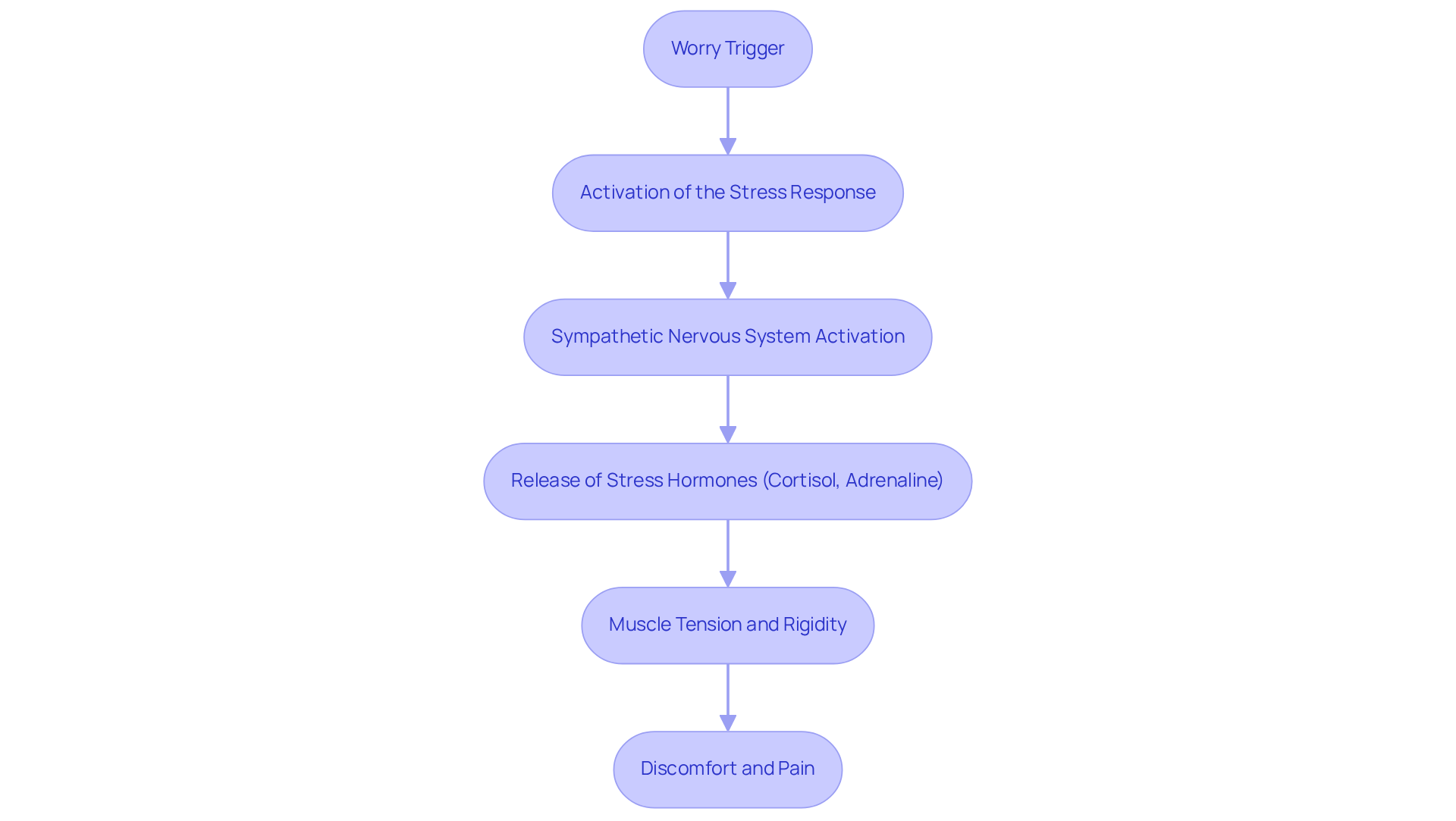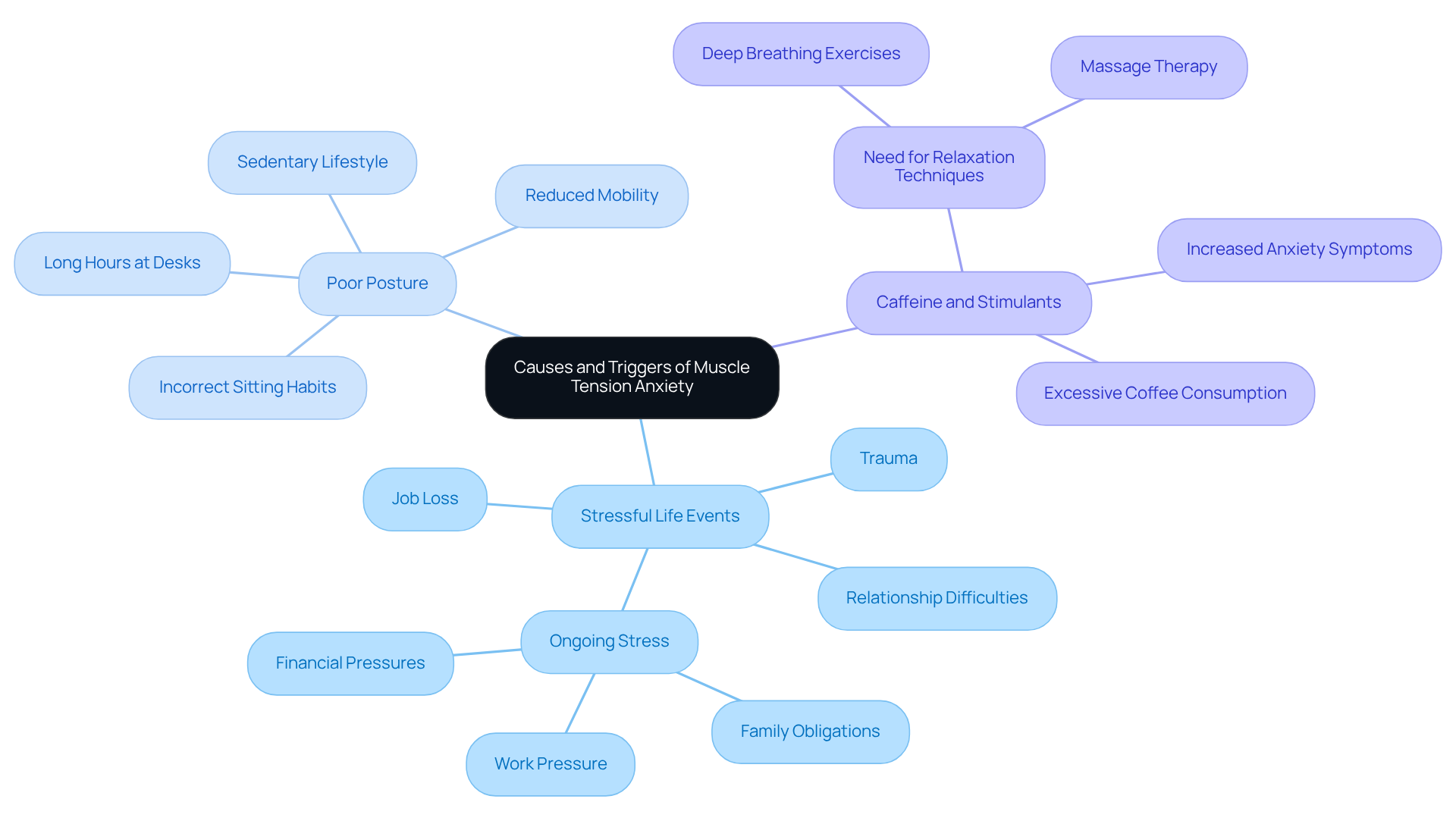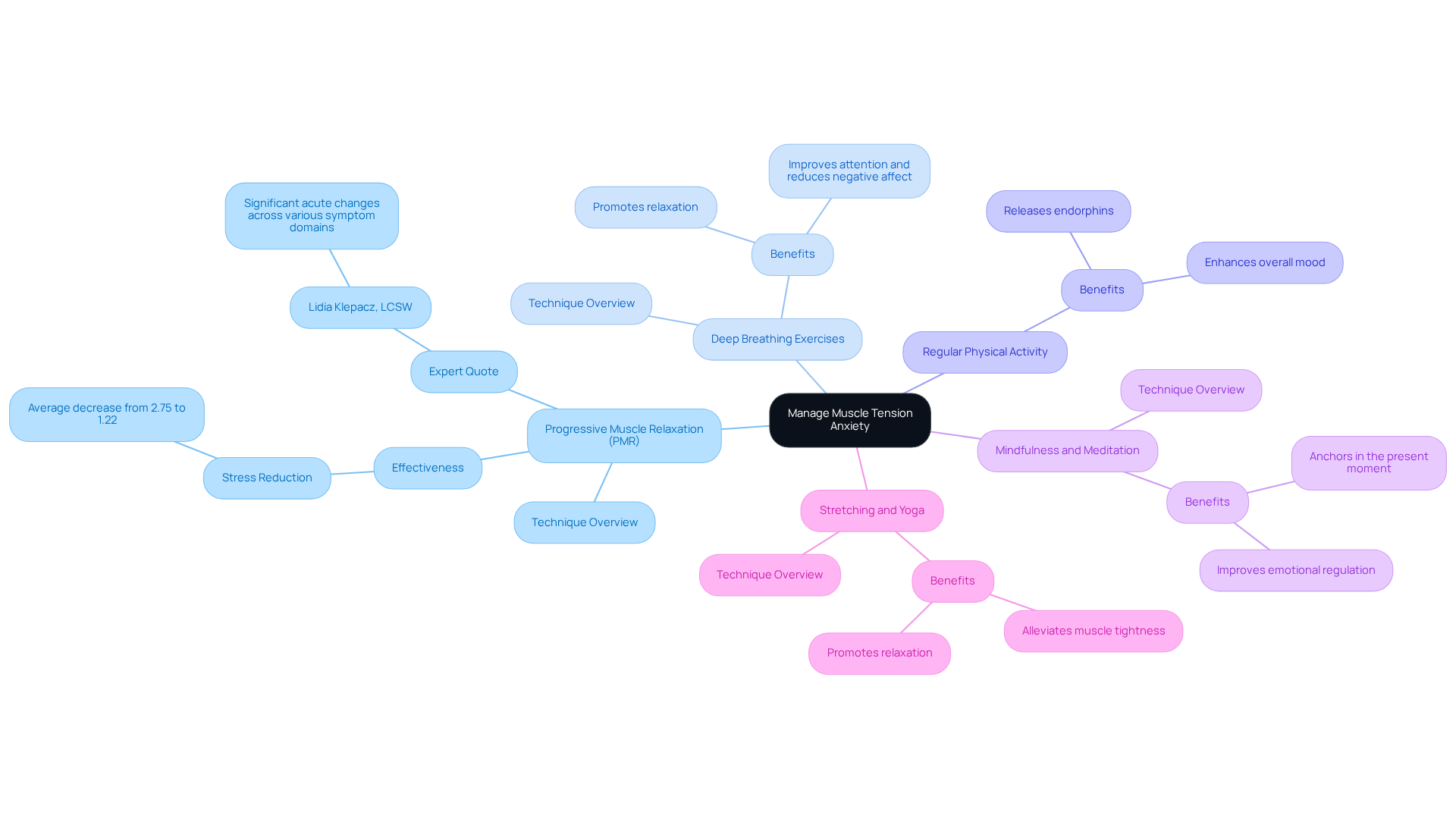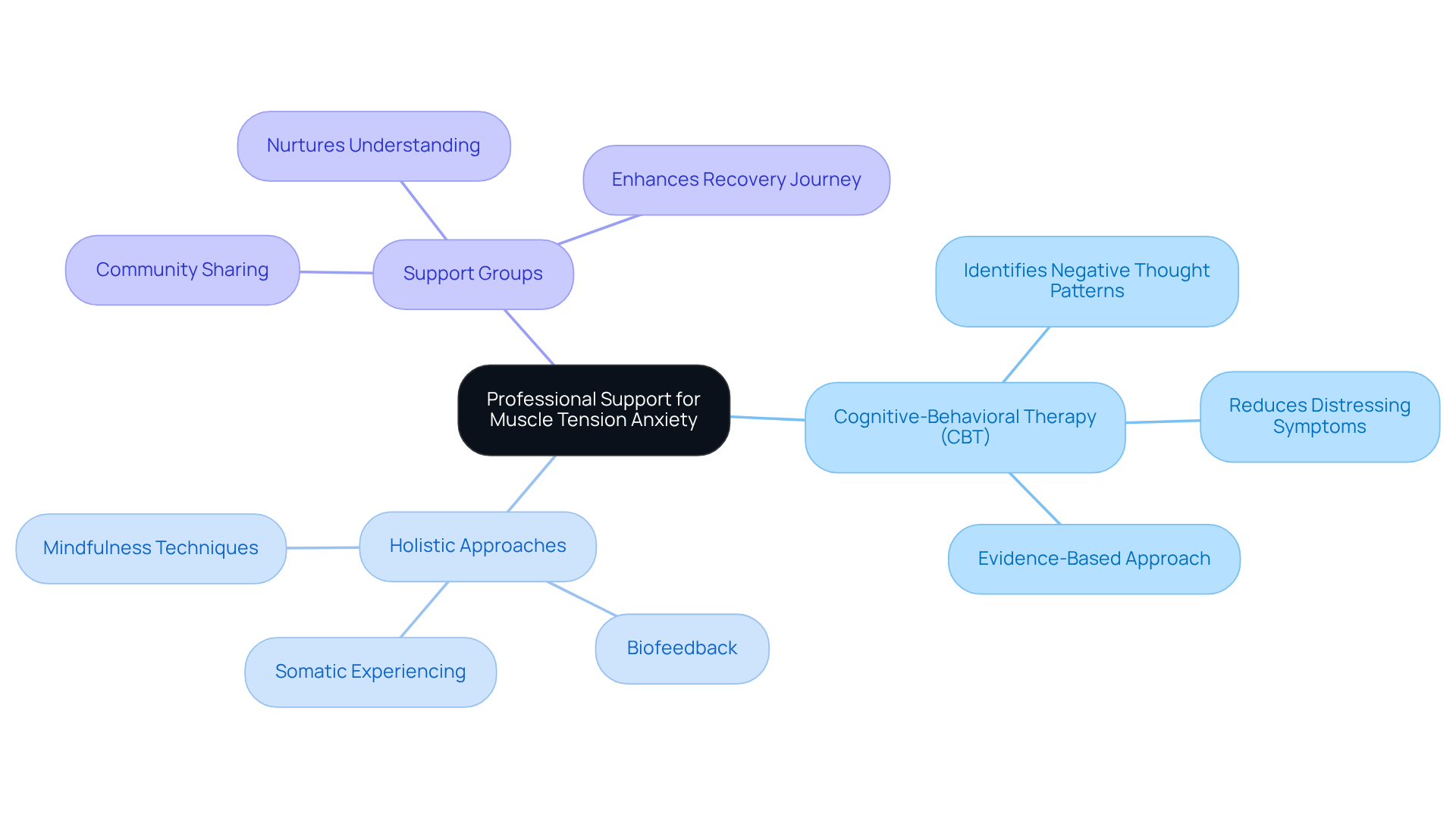Overview
The article presents four compassionate steps to help manage muscle tension anxiety. These steps include:
- Understanding the physiological mechanisms behind anxiety
- Identifying personal triggers
- Implementing relaxation strategies
- Seeking professional support
By addressing the root causes of muscle tension—such as stress and poor posture—and suggesting techniques like progressive muscle relaxation and cognitive-behavioral therapy, the article emphasizes a holistic approach to alleviating anxiety and enhancing overall well-being.
Have you ever felt overwhelmed by the weight of stress in your life? Recognizing the signs of muscle tension is the first step toward healing. By gently exploring these causes, you can begin to uncover effective strategies that resonate with your personal experience.
In addition to this, the article encourages you to embrace relaxation techniques that nurture your body and mind. Consider incorporating practices that resonate with you, allowing for a soothing release of tension. Seeking professional support can also be a vital step in your journey, providing guidance and understanding tailored to your needs.
Ultimately, this comprehensive approach not only alleviates anxiety but also fosters a deeper sense of well-being. Remember, you are not alone in this journey—support is available, and taking these steps can lead to a more peaceful and fulfilling life.
Introduction
Muscle tension anxiety often manifests as a physical response to stress, leaving individuals feeling trapped in a cycle of discomfort and unease. Understanding the triggers behind this condition is crucial for anyone looking to reclaim their sense of well-being.
- Have you ever felt overwhelmed by this tension?
- What if there were effective strategies to not only alleviate this discomfort but also empower you to confront your anxiety head-on?
This article delves into practical steps that can help manage muscle tension anxiety, offering insights and techniques that pave the way for a more relaxed and fulfilling life. As we explore this further, we aim to provide you with the support you need on your journey to healing.
Define Muscle Tension Anxiety and Its Physiological Mechanisms
is the physical rigidity and discomfort that arises as a direct response to worry. Have you ever felt overwhelmed by your past? When muscle tension anxiety strikes, the body activates its stress response, often referred to as the 'fight or flight' response. This reaction triggers the sympathetic nervous system, leading to increased tension as the body prepares to confront perceived threats. Common physiological responses include the release of stress hormones such as cortisol and adrenaline, leading to muscle tension anxiety as muscles contract and remain tense for extended periods. This ongoing tension may lead to discomfort and pain, contributing to muscle tension anxiety as individuals become more attuned to their physical sensations, further exacerbating their stress levels.
At The Emerald Couch, we understand that the journey to wellness is unique for everyone, particularly for those who have faced trauma. Therapy duration can vary, but many clients begin to notice improvements within 4 to 6 weeks. Our tailored treatment strategies are designed to meet your individual needs, ensuring you receive the specialized support necessary for your stress and trauma recovery. We recognize that finding the right therapist is essential; on average, individuals may meet with three therapists before discovering the right fit. Our approach focuses on building a trusting relationship, allowing you to share at your own pace and comfort level.
In addition, we offer virtual appointments for those who may require them. We are here to assist you in navigating your journey, providing a safe space to discuss your worries and work towards alleviating discomfort and stress. Remember, you are not alone in this process, and seeking help is a courageous step towards healing.

Identify Causes and Triggers of Muscle Tension Anxiety
Muscle tightness discomfort can develop from a variety of factors, including environmental stressors, personal experiences, and lifestyle choices. Understanding these triggers is essential for in the body. Have you ever felt overwhelmed by your past? Key triggers include:
- Stressful Life Events: Significant changes, such as job loss, relationship difficulties, or trauma, can elevate anxiety levels, resulting in increased muscle tension. For instance, individuals facing a major life transition often report heightened physical discomfort, as their bodies react to emotional stressors. Continuous stress from work, family obligations, or financial pressures can lead to a persistent state of anxiety and muscle tension in the body. About 75% of adults encounter ongoing stress, which is strongly associated with muscle tension, particularly in the neck, shoulders, and back. Chronic stress can also result in muscle tension, persistent bodily pain, reduced flexibility, and postural issues.
- Poor Posture: Incorrect sitting or standing habits can result in strain and discomfort, particularly in the neck and shoulders. This is often exacerbated by long hours spent at desks or using electronic devices, contributing to discomfort and reduced mobility. Persistent strain in the body can result in bad posture, influencing mobility and heightening the likelihood of musculoskeletal issues. Sedentary lifestyles can lead to muscle tension, resulting in stiffness and making it more difficult for the body to relax. Regular exercise is crucial, as it enhances strength and flexibility, aiding in the reduction of tension-related pain. Participating in consistent exercise aids in the release of endorphins, which are natural mood enhancers, further promoting relaxation of the body.
- Caffeine and Stimulants: Excessive consumption of caffeine can exacerbate anxiety symptoms, resulting in heightened bodily stress. Many individuals may not realize that their daily coffee consumption could be contributing to their physical discomfort. To counter the impacts of caffeine, techniques like massage therapy can greatly alleviate stress by enhancing blood circulation and encouraging relaxation.
Comprehending these prompts is vital for handling stress in the body efficiently. By identifying the underlying causes, individuals can take proactive steps to address their symptoms and improve their overall well-being. Seeking support from professionals, such as therapists, can provide valuable assistance in navigating these challenges. Remember, you are not alone on this journey, and help is available.

Implement Strategies to Manage and Overcome Muscle Tension Anxiety
To effectively manage and overcome , consider implementing the following strategies:
- Progressive Muscle Relaxation (PMR): This technique involves systematically tensing and then relaxing each muscle group in your body. Start at your toes and move upward to your head, concentrating on the feelings of strain and relaxation. Research indicates that PMR can significantly lower stress levels, with studies showing an average decrease in stress scores from 2.75 to 1.22 after PMR sessions. Have you ever felt the weight of tension lifting as you let go?
- Deep Breathing Exercises: Engage in deep, slow breathing to activate your body's relaxation response. Inhale deeply through your nose, hold for a few seconds, and exhale slowly through your mouth. As Lidia Klepacz, LCSW, observes, "Deep breathing methods can greatly reduce strain and encourage relaxation." This technique has been demonstrated to improve relaxation and decrease muscle tension anxiety, making it a useful resource for handling stress. Can you feel the calmness enveloping you as you breathe?
- Regular Physical Activity: Incorporate regular exercise, such as walking, yoga, or swimming, to help release built-up stress and enhance your overall mood. Physical activity is recognized to stimulate the release of endorphins, which can reduce feelings of worry and stress. What activities bring you joy and make you feel alive?
- Mindfulness and Meditation: Employ mindfulness techniques to anchor yourself in the present moment, effectively decreasing anxiety and physical stress. Mindfulness has been linked to improved emotional regulation and a reduction in muscle tension anxiety. How often do you take a moment to simply be?
- Stretching and Yoga: Gentle stretching or yoga can alleviate muscle tightness and promote relaxation. Concentrate on regions where you usually experience tightness, such as your neck, shoulders, and back. Research has demonstrated that yoga can greatly decrease stress and enhance overall mental health. Can you imagine the relief that comes from gentle movement?
By incorporating these approaches into your daily schedule, you can efficiently handle stress and improve your overall mental well-being. Remember, you are not alone on this journey, and seeking support is a sign of strength.

Seek Professional Support for Muscle Tension Anxiety
When physical strain and stress become overwhelming, and self-help techniques fall short, seeking expert assistance is essential. At , our compassionate mental health professionals provide a variety of therapeutic interventions tailored to your unique needs:
- Cognitive-Behavioral Therapy (CBT): This evidence-based approach empowers individuals to identify and reshape negative thought patterns that heighten anxiety and muscle tension. Research shows that CBT effectively reduces distressing symptoms, making it a cornerstone of treatment for many. As Ingmar Heinig insightfully notes, "Although effective therapies exist, treatment rates for disorders related to stress are low, raising the question of why affected individuals do not receive treatment." Medication may be prescribed by healthcare providers in some instances to ease feelings of unease and diminish muscle tension anxiety, offering immediate relief while take effect.
- Holistic Approaches: Our therapists often integrate holistic practices such as mindfulness, biofeedback, and somatic experiencing. These techniques address both the physical and emotional dimensions of stress, fostering a sense of overall well-being.
- Support Groups: Connecting with support groups allows individuals to share their experiences with others facing similar challenges. This sense of community nurtures understanding and can significantly enhance the recovery journey.
The importance of professional assistance cannot be overstated, especially for those dealing with muscle tension anxiety. With stress-related disorders affecting millions globally, the demand for effective treatment options is critical. Studies reveal that while many individuals struggle with anxiety, only a small fraction seek help, often due to barriers like self-reliance or doubts about treatment efficacy. In fact, 40% of people have never considered reaching out for help regarding anxiety disorders. By taking the step to contact The Emerald Couch, you can access the resources and support necessary for healing and personal growth. Have you ever felt overwhelmed by your past? Remember, you are not alone, and help is just a call away.

Conclusion
Muscle tension anxiety poses a significant challenge for many individuals, often manifesting as physical discomfort arising from emotional stressors. By understanding its physiological mechanisms and recognizing the triggers that contribute to this condition, you can take meaningful steps toward alleviating your symptoms and enhancing your overall well-being.
This article outlines essential strategies for managing muscle tension anxiety effectively. Techniques such as:
- Progressive Muscle Relaxation
- Deep breathing exercises
- Regular physical activity
- Mindfulness
- Yoga
can significantly reduce tension and promote relaxation. In addition, seeking professional support through therapies like Cognitive-Behavioral Therapy can provide tailored interventions that address both the physical and emotional aspects of anxiety.
Ultimately, acknowledging and addressing muscle tension anxiety is crucial for personal growth and healing. Have you ever felt overwhelmed by your past? By implementing these strategies and reaching out for professional help when needed, you can reclaim your sense of peace and well-being. The journey toward managing muscle tension anxiety may require effort and support, but it is a vital step toward a healthier, more balanced life.
Frequently Asked Questions
What is muscle tension anxiety?
Muscle tension anxiety is the physical rigidity and discomfort that arises as a direct response to worry, often related to the body's stress response.
How does the body respond to muscle tension anxiety?
When muscle tension anxiety occurs, the body activates its stress response, known as the 'fight or flight' response, which triggers the sympathetic nervous system and leads to increased muscle tension.
What physiological responses are associated with muscle tension anxiety?
Common physiological responses include the release of stress hormones like cortisol and adrenaline, which cause muscles to contract and remain tense for extended periods, leading to discomfort and pain.
How does ongoing muscle tension affect individuals?
Ongoing muscle tension can lead to increased discomfort and pain, making individuals more aware of their physical sensations, which can further exacerbate their stress levels.
How long does it typically take to notice improvements in therapy for muscle tension anxiety?
Many clients begin to notice improvements within 4 to 6 weeks of starting therapy.
How does The Emerald Couch approach therapy for muscle tension anxiety and trauma?
The Emerald Couch offers tailored treatment strategies designed to meet individual needs, focusing on building a trusting relationship and allowing clients to share at their own pace.
Is it common to meet multiple therapists before finding the right fit?
Yes, on average, individuals may meet with three therapists before discovering the right fit for their needs.
Are virtual appointments available for therapy?
Yes, The Emerald Couch offers virtual appointments for those who may require them.
What is the overall message regarding seeking help for muscle tension anxiety?
Seeking help is a courageous step towards healing, and individuals are encouraged to know they are not alone in their journey to alleviate discomfort and stress.




